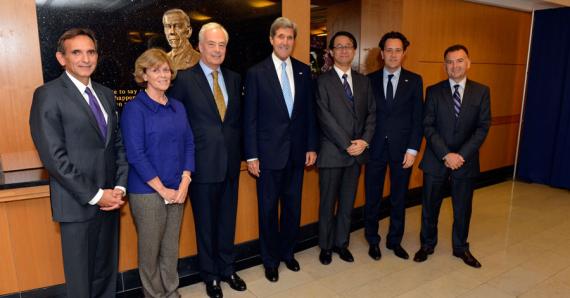

Our Bureau of Energy Resources (ENR) has come a long way over the past two years. This fall, we celebrated our second anniversary in parallel with the commemoration of National Energy Action Month and the recent D.C. Greening Embassies Forum.
Secretary Kerry recently noted, “Foreign policy is economic policy, and economic policy is foreign policy.” Energy is at the nexus of national security, economic prosperity, and environmental sustainability. It is the lifeblood of every economy in the world and connects us through global markets, transportation networks, and shared innovations. We are committed to achieving sustainable energy through continued engagement with governments, the private sector, NGOs, and citizens across the world, while navigating the geopolitics of today’s energy economy.
We must address development issues by increasing energy access for the world’s poor. In the Western Hemisphere, we are active in “Connecting the Americas” (Connect 2022), a Summit of the Americas initiative through the Energy and Climate Partnership of the Americas (ECPA), that seeks to enhance regional energy connections. We’re also working to balance the potential impacts that increased energy demand has on other resources, such as water. For example, we were recently in Bogota, Colombia, for the Nexus Dialogue on Water Infrastructure Solutions, helping to promote best practices in the planning, financing, and operation of water infrastructure that can maximize environmentally sound energy development and generation.
In the Asia-Pacific region, there are an estimated 387 million people who lack access to electricity. Thus we must promote sustainable development through the U.S.-Asia Pacific Comprehensive Energy Partnership (USACEP) by encouraging market conditions that support the use of wind, solar, and geothermal energy projects. In fact, the United States will provide up to $6 billion in financing to help make meaningful progress in alleviating energy poverty in the region.
Through Power Africa, we are collaborating in a public-private initiative to expand electricity access by at least 20 million new households and commercial entities in sub-Saharan Africa. This month, we met with 21 African ambassadors to discuss Power Africa and the African Growth and Opportunity Act.
We are also working globally with the United Nations and the World Bank on the Sustainable Energy for All (SE4ALL) Initiative, aimed at providing universal access to modern energy services by 2030, while seeking to increase energy efficiency and doubling the share of renewable energy in the world’s energy mix.
There is still much work to be done, and it is particularly important to engage our youth on these overarching issues of sustainability that impact our shared future. For example, we are thrilled to work with musicians like Linkin Park, who are supporting the SE4ALL Initiative through their Music for Relief and Power the World sustainability campaigns.
As we turn to the new year, we will be working on the installation of mini- and off-electric grids in India, Bangladesh, and Ghana. This is just one of many steps promoting sustainable energy practices that will meet a growing energy demand while ensuring a healthier environment and addressing climate change for future generations. As these shifts transform the world’s energy landscape, our teams will continue to work globally to support the market conditions that will foster the development and deployment of technologies that draw upon all of our energy sources in a cost-efficient way toward a low-carbon future.
About the Author: Julia Nesheiwat serves as Deputy Assistant Secretary of State for Implementation in the Bureau of Energy Resources.
 View Map
View Map